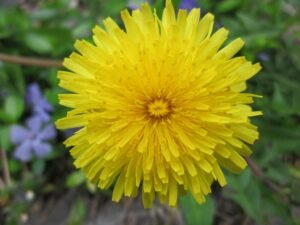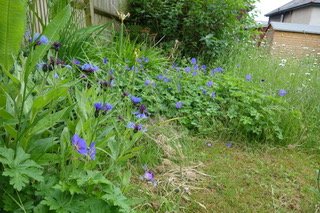Diligent was the only word that could be applied to my father’s pursuit of dandelions in our front yard. Clearly Iremember him in his worn work boots, laced to the top, socks rolled down touching, and an old white t-shirt and shorts of some kind, though never cut offs. Covering his head would be an old sailor’s hat turned down like a white mushroom cap. His clip on sunglasses would cover his regular ones, and the milky colored plastic nose protector was attached to the bridge. He would be bent over with his trusty pocket knife stuck in the earth, prying up their roots before those yellow pincushions could turn to seed. Every season except winter he would scout for new emergents.
***

I must have inherited that particular gene from him. This spring I’ve been on a tear. Previous seasons I’ve dug here and there trying to stave off the dandelions’ explosion, but it was half-hearted at best. This year, it’s been termination to as many of them as I could get. And I know they are useful in so many ways—dandelion wine, sautéed dandelion greens, dandelion root tea for a diuretic but thank you, I can pee on my own.
Before the dandelions though, hairy bittercress was in my crosshairs. I detest them extraordinarily. It was as if a gauntlet was thrown down, either by them or by me to get. every. one. Early in March I started pinching out the small, basal rosette leafed weed, sometimes nearly freezing my forefinger and thumb from pulling their small knobs at soil level to get all the roots. There were so many of them that I filled, jam packed, SEVENTEEN plastic grocery bags full of the noxious weed, and more went in the yard bins.
If I wanted to make any headway, it was imperative that I get to them before their seed formed. They produce slender pods that when ripe and touched, burst explosively sending seeds far from the parent. I’ve even caught one in my eye. Their seed dispersal strategy is referred to as ballochory (ballistic) and is a type of rapid plant movement. I call it heinous.
I’ve often thought that if only those far flung seeds would grow a carrot or a beet, there would be no world hunger. Same with the parachute seeds dandelions send out. Or any weed really—that’s what makes them weeds—their prodigious output of seed coupled with their adaptability to grow most anywhere with only enough to sustain them, until, (you guessed it) more seeds can be produced. I know a weed is just a plant growing where you don’t want it to, but I believe there is more to it than that. Can you imagine if Autumn Moon or Sword Dance peonies grew like chickweed? Would they then be weeds too, I wonder?
Wire grass, on the other hand, has an insidious knuckle branched root system that can trick you. It will obligingly break off to allow its green blades to be pulled up, attached to a slender hard white root of varying length. The unsuspecting human walks away feeling victorious, while 99% of the rhizome system remains intact, chuckling, I assume, at ITS victory.
I remember once attacking wire grass that had grown in and around an old rose bush that was on my property. My father was visiting and watched as I grunted, straining to weed out this intruder. I had a hand trowel that I was using to follow a particularly deep root, knowing even a small bit left would regenerate. Finally, my father said, “Nan, why are you wasting your time? You know it’ll just come back!”
He was right of course. But it felt so good! So cathartic, as if I had some control over the situation, over something, even myself. Control is an illusion, of course, as weeds show me daily, in no uncertain terms. Yet I can’t deny the sense of accomplishment, however brief, from a plastic bag stuffed with bittercress.
This afternoon I could not sit out by my pond to enjoy just sitting before I was up and at the weeds that my eye spied—it is almost like I cannot not react if I see them. Should I be worried? Some internal prodding takes over and my derrière is once again up in the air as I bend from the waist to pull and pull or pry and pry to pop those devils free from the earth.
Here’s the thing. Weeds are bullies. They don’t play fair. They are aggressive and noxious and opportunistic and sneaky, and they will overtake any space and plants if not dealt with. They don’t respect boundaries. They’re like Russia invading Ukraine, only they are really good at it. Enough already. I’m a flower person, a Sweet Bay Laurel Leaf and oregano person. A twenty fig plants person. Heirloom tomatoes. But mostly it’s the beauty and scent of flowers I spend my time on, and that’s why the weeds make me crazy, because they are so damn successful at annihilating anything around them.
And once they have a foothold, watch out. This happened to a fifteen-year-old stand of the most fragrant Sweet Williams that fronted my thirty-year-old goldfish pond out back, built by neighbor Mr. Nicholson, a bricklayer, and myself. But two years ago, I noticed mid-summer a stream of smallish wasps entering and exiting right from the middle mass of the ‘pinks’ as the plants are also known. I freaked out thinking I needed to get rid of the wasps before someone was stung. But the naturalist in me got to watching the vertical insect ‘runway’. They must have had an air traffic controller, so graceful and perfect was the timing for those underground flyers’ travel. I only saw them in the air, until one evening I cautiously lifted the pinks, uncovering the ground hole that was home base. It was a four inch oval opening, and since they were fascinating to watch, and did not seem aggressive, I let them be.
That was my mistake. The pinks’ area was about 5’ by 2’ and the wasps flight pattern was the same each time, but I enjoyed them and didn’t want to get involved. This allowed annual bluegrass to take hold there, and, you guessed it, send up seed stalks to propagate more. By the time the wasps were gone, the grass had entrenched itself and wiped out the Sweet Williams in the middle of that lush stand where their entrance was. Now, to reinstate that fifteen year growth of Sweet Williams I am going to have to start new plugs of the dianthus, clear out ALL the vegetation down to bare dirt, and start again. And the damnable grass still there just keeps putting up more seed stalks—like I said, weeds just don’t play fair.
There are other weeds that plague a flower and vegetable loving gardener. I call them animal-weeds. They also don’t play fair and can wreak havoc instantly. Deer now roam my yard at night with freedom and impunity. Last summer I stepped in two piles of deer poop! This year, one. Last summer they mowed off the Robert Stevenson lilies I was patiently waiting to bloom so I could smell their heavenly scent. This year they got the one level with the pond—meaning, they had to somehow make their way up the small retaining rock wall and bite off the top of the bloom stalk, so again no heavenly scent. I’ve protected the remaining lilies (no guarantee) behind plastic chairs trying to hide and prevent passage toward those remaining. I’ve sprayed the plants with REPEL ALL, though I’m unconvinced it will work. I’m planning to build stout wire cages to encase the lilies hoping they’ll reach maturity unscathed. ‘It just shouldn’t be this hard’, I keep repeating, my mantra these days.
There’s one more kind of weed that afflicts me—one of my own making. Weed-thoughts arise daily, hourly even, much to the chagrin of my want-to-be-more evolved mind. You’ve heard the expression, ‘off in the weeds’? I find myself there routinely. Judgement, criticism, wanting to be right, especially about weeds and where they shouldn’t be, how it shouldn’t be so hard, life should be fair.
But life is not fair, red in tooth and claw I learned, when my beloved son, aged twenty-three, died suddenly with no one asking me what I’d prefer, no vote taken. This and the other thoughts keep a low grade resentment running, an out-of-sight electrical current that might be drawing more negativities toward me. For that possibility alone, I should drop them like hot potatoes, but my hand remains closed for whatever reason.
***

My friend Evie brought me a poem she’d written entitled “Weeds Don’t Cry”. She calls them ‘orphans of wildness’ and praises their strength and usefulness in nourishing the breeder pigs on her farm. Five foot tall lambs’ quarters, clover, amaranth and yes, even dandelions suffice until the corn comes in to fatten the swine.
Her poem ends on an encouraging note, though, one I want to emulate, a generous gift to self. One perhaps that I can use to get off my particular gerbil wheel of thoughts. Seeing herself as ‘resilient, strong, able to flourish in adverse conditions,’ she holds herself up proudly to a weed’s likeness. She equates each weed she pulls as an homage to her endurance.
Resonance washes over me as I realize that I, too, have endured. I hoist that mantle of resilience, strength, and ability to flourish in adverse conditions over my shoulder and step forward.
Breathe in: my pile of weeds, tribute to all that I have survived—such a kind thought.
Breathe out: all my whining.
Maybe my hand will open after all.

Share this post with your friends.

